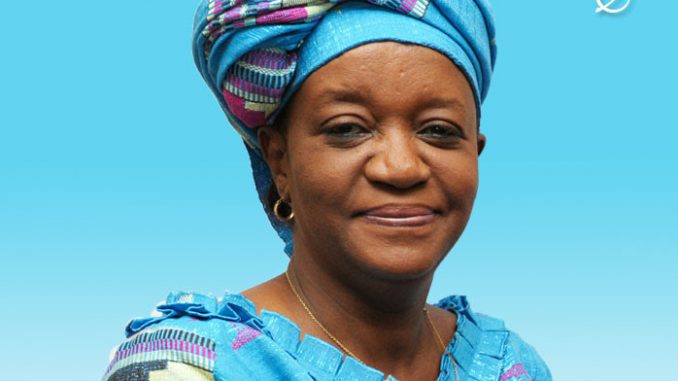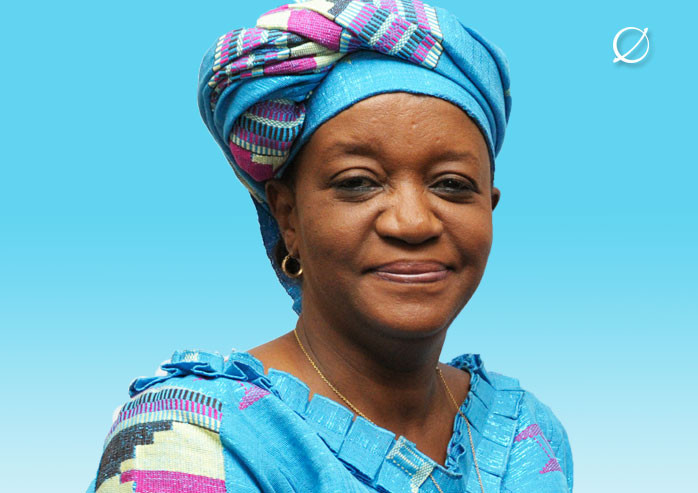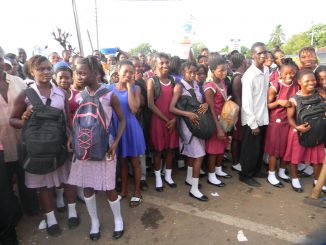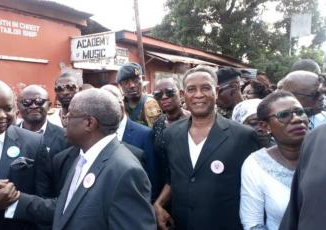
Source: Thomson Reuters Foundation – Thu, 27 Feb 2014 07:33 AM
NEW YORK (Thomson Reuters Foundation) – Warring factions in conflicts around the world continue to use rape as a weapon of war, often more effectively than guns, to shred societies and destroy lives. It is Zainab Hawa Bangura’s job to disarm them.
Whether the victim is a 3-month-old baby in Liberia, a woman in a Somali refugee camp or a man in a Syrian prison, “for me, one rape is too many,” Bangura, the U.N. special representative on sexual violence in conflict, told Thomson Reuters Foundation during an interview in her U.N. office.
Since her appointment to the post in September 2012, Bangura – a former foreign minister and minister of health and sanitation in her native Sierra Leone – has traveled extensively, meeting with victims of sexual violence and crafting her objectives.
“You just have to visit each and every community,” said Bangura, an energetic 54-year-old who speaks firmly and with passion.
“You meet 260 children in the DRC (Democratic Republic of the Congo) who are orphans who have been abandoned by their parents because they were born out of rape. You meet a father in Mogadishu whose two children have been raped; one is 4, one is 6. You meet a mother in Liberia whose 3-month-old baby has been raped. So it’s everywhere you go.”
The problems in post-conflict zones are often as troubling as those in current crises, she said.
“You meet a woman in Bosnia who says, ‘How can you ask me to think about the future when the past is still with me?’ She said, ‘They took my life away without killing me’”, she said. “The war has finished 20 years ago, but she’s still dealing with the pain of it. So she doesn’t have a future as far as she is concerned.”
CHILDREN, VICTIMS OR BORN OF RAPE
Because the problem of sexual violence in conflict is so huge, she has identified eight priority countries: Colombia, Bosnia, Central African Republic, DRC, Cote d’Ivoire, Liberia, South Sudan and Darfur, Sudan. In addition, she and her office are also following Syria, Mali, Somalia and Libya.
Her office recently implemented the Monitoring, Analysis and Reporting Arrangement (MARA), mandated by the U.N. in late 2010, which will provide data about the extent of rape in conflict zones. The first training session took place in Uganda in February, and women protection advisors have been deployed in South Sudan, Mali and Somalia, with the Central African Republic, DRC and Ivory Coast to follow.
Two emerging issues that she feels have not yet been addressed are men and boys raped in conflict – particularly during detention, as a means of intimidation – as well as children who are the product or victims of rape.
With NGOs focused on the needs of women, she said, “Nobody asks the men.” Given their reluctance to come forward out of embarrassment or fear of being prosecuted for homosexuality in some countries, providing services for them is a challenge, she said.
Children who are either the product or victims of rape in conflict zones include Bosnian children, now teenagers, who now are ostracised from society and suffering from an identity crisis.
They also include children in the DRC, the products of rape, who are abandoned by their mothers and called snakes.
“In the African culture, snakes are evil. They call them snakes because these are evil children, conceived by the enemy, so we don’t want them,” Bangura said, recalling her meeting with a mother who was gang-raped by five men in the DRC and wants to strangle her child.
And then, she said, there are the children who are raped. During her visit to the DRC last year, she found 11 babies raped between the ages of 6 months and 12 months, 59 between the ages of 1 and 3 years, and 180 between the ages of 5 and 15 years.
In Liberia last year, she said, 10 children died as a result of rape.
Asked why this happens, she said, “When you’re degraded to that level in the conflict, it brings out the worst in you, so you just want to do whatever the lion can do when it gets hold of the lamb.”
LONDON SUMMIT
On June 11-13, UK Foreign Secretary William Hague will host a landmark Global Summit in London on Ending Sexual Violence in Conflict. Expected to be the largest gathering ever held on this issue, the meeting will bring together representatives from more than 100 countries, including members of governments, NGOs, civil society, the private sector and a host of U.N. agencies.
Bangura aims to achieve three goals at that summit.
“One is to continue to break the silence surrounding this crime. I think the conference, being the first-ever global summit, with a huge participation of 1,500, will really give visibility to this problem.”
Her second goal – now that a global legal framework is in place and 139 countries have signed on to the “Declaration of Commitment to end Sexual Violence in Conflict” – is to get countries to agree to take steps to implement the resolutions they have signed.
“This is the operational aspect of it: What are we going to do? How are you going to do it? When are you going to do it? What support do you need from us as the U.N.? So we get the commitments from them.”
Her third objective is to bring in new partners in the fight against sexual violence in conflict, particularly from the private sector, which, for example, can be encouraged to scrub its supply chain of minerals extracted from conflict zones.
Joining the battle wasn’t difficult for Bangura, who lived through the civil war in Sierra Leone from 1991 to 2002. It was an experience that still pains her but increases her empathy and gives her hope now.
“When I travel to victim countries, when these women come to talk, sometimes I just hold their hands, and they don’t talk, they cry. And I just cry with them because I come from a post-conflict country and I know what we went through. The fact that they have somebody who is listening to them, more of them come… They know you know. They know you understand,” she said.
“We had about 65,000 women who were raped during the course of the conflict in Sierra Leone. In the worst time of the conflict, I never thought we would get out of it,” she said.
“But we ended the conflict. We addressed the issue of sexual violence. We put in place the right laws. We trained the police to respond to them. We have special courts for rape. It became a crime not only for perpetrators, but for marital rape. We have it in our laws. So if we can do it, so can anybody. But first you have to have the political will.”








We welcome comments that advance the story through relevant opinion, anecdotes, links and data. If you see a comment that you believe is irrelevant or inappropriate, you can flag it to our editors by using the report abuse links. Views expressed in the comments do not represent those of the Thomson Reuters Foundation. For more information see our Acceptable Use Policy.